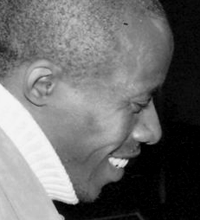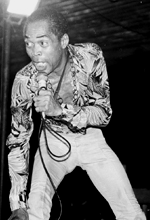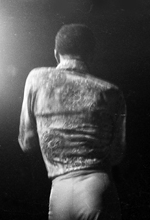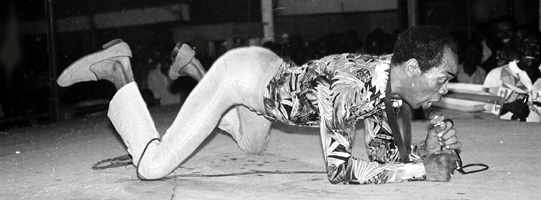Rumours
In the afrobeat underground it normally starts with the whisperings.
One of the guys in the house may have observed the master humming
a melody... or clapping a drum pattern... or scribbling away at
paper. Perhaps, simply writing some chords...
The next stage would see him at the
old upright piano, which sat in the hallway of his house, Kalakuta,
checking out different chords and working out individual parts for
each instrument in his Egypt 80 Orchestra. He would usually be joint
in hand, in Y-fronts, and not much else. Hitting notes and feeling
them. Then you knew for sure — if you lived in the house,
or were one of the frequent visitors — because his dancers
and the girls in his harem would start the rumours.
Fela don get new song... Fela
don begin new number...Fela dis... Fela dat... Na fire......
By this time, the word was up. Everyone
knew. From the runners selling weed on the streets to the call girls
by the street corners waiting for their johns to relieve their boredom.
Everyone knew a new number was coming. The punters in the local
pubs, musicians waiting on the latest tune in case they wanted to
sit in with the band later... Students, workers, market women...
The closer you were to Ikeja — the Lagos surburb where Fela
both lived and worked before his transition — the stronger
the rumours grew, and as the days went by, they became more than
rumours.
Rehearsals
Soon Wednesday evenings at the Shrine
would have the familiar sounds and smells that accompany a Fela
Kuti rehearsal.
First, having decided that the tune
he had been hearing in his mind had come to stay, he would send
for his rhythm section, jazz drums and miscellaneous percussions:
five in all... add to that twin guitars (tenor and rhythm), then
twin basses and electric piano. Since he writes his music line for
line, he would dictate parts to each musician. They would work on
their parts until the whole thing became the groove he
wanted, adding layers and layers of sound, until the wall of sound
was ready to hit you.
By this time fans would be waiting
outside his house — drinking, smoking, flirting, eating or
just listening to the sounds conjured by the sonic scientist. A
few bold enough to venture inside would press their bodies against
the walls adjourning the rehearsal rooms and cup their hands to
their ears for a closer listen to the band. At this stage only the
diehards would be around. You could hear the harmonic carpet but
not much else. No majestic horn melodies, no breaks — and
yes, no killer vocals. Those would come later. What you had now
though was a wicked groove and some super bass lines.....
Fela
He sits facing the band. Shirt open,
smoking a cigarette. He drags on the cigarette and looks at the
horn section. Sitting opposite him, ten-man strong, they range from
trumpets through flugal horns to the reed section with twin alto
tenor and baritone saxophones. They are flanked by the chekere and
sticks players.
He counts off a tempo and the rhythm
section come in on the one. He plays a melody again over the groove.
The horn players pick up the melody and play together with different
degrees of success. He plays the melody again. Some musicians have
scraps of paper with the melody sketched out and they look at this
while they blow. Others prefer their ears and play patiently listening
to his lines on the electric piano.
After a few attempts they get it right.
Then he guides them more gently, sketching the form of the tune
aurally: how many times the melody must be played; how many sections
there were; what harmonies were for the horns... He plays the backing
riffs for instrumental solos and they fall in behind him, riffing
away until they were one tight, loud, section.
When Fela has a new number to work
on, Wednesday nights at the shrine were rehearsal nights. The club
is as full as on a regular, paid, performance, with people listening
intently. Only the vibe is different: there is no dancing. Everyone
is quiet. Lagosians are witnessing one of their most innovative
composers at work and the atmosphere is one of respect for his
craft. At the first sign of the melody from his keyboard, someone
somewhere picks it up and starts humming.
Then you begin to hear the usual praises:
Aaah Fela, you are too much! Baba 70, Choirmaster...
They die down quickly though. They're 'short and sharp'. Just long
enough for him to know that we all know he is the man. Nothing is
allowed to disturb his concentration.
When the band stops to try something
different, or correct a mistake, there is no reaction. The crowd
knows they are privileged observers of a ritual, as band and maestro
do their thing. When the tune begins to take shape, people nod
heads appreciatively, and in amazement, at the gift of a man whose
music moves people.
'I go play una my new
number'
He turns to the rhythm guitar player and mouths the pattern. The
guitar player nods and corrects the mistake. Now the band as a whole
gets his attention. You notice the little things, like his attention
to detail. He glares at the chekere player when the latter flags
a little. He notices when a member of the horn section fluffs his
lines and calls his attention. Sharp ears. Once again, he works
the band as a whole until they smoothen out the rough passages.
The band now begins to feel it. The crowd knows it too.
Some members of the horn section push out their chests and blow
as if their lives now depend on it. When the song has a definite
intro, middle section and ending, the female singers climb on stage,
and you can feel the anticipation.
He takes out a sheet and consults it.
"Oya make una begin", he tells the singers, and each one
approaches the microphone and delivers her lines. When he is satisfied,
they do it together in unison at different sections of the song,
until gradually they have mapped out an entire vocal arrangement.
Now with each member knowing roughly his or her place in the piece
the band starts working on the trickier sections. Breaks. Starts
and stops. With his adoption of a second bass guitar and the large
gbedu drum, the layers in the music are more pronounced. It is groovier
and funkier at the same time.
This would go on once weekly, for about a month or two, depending
on the complexity of the music and the form the band was in. A band
can be like a sports team. Some days it works like a finely tuned
sports car, on others it is so-and-so. We all wait now: for him
to like what he hears enough to look at the band leader, Lekan Animashaun
(Baba Ani), and nod his head — then go on to utter those magic
words at any of his weekend shows:
"Brothers and sisters, e be like
say i go play una my new number next week"
and you confirm it when you see the
band at what is usually the last time they will rehearse the song.
Bar its use as a sound check now and again, this tune whose birth
you witnessed will now only be played live at shows, until it is
recorded and released on a long play record, and then rested, as
the band goes through the process once again.
Don't they know it. The shrine has a carnival atmosphere. Smoky
bluesy and funky. Everyone who is anyone is around. Fans, musicians,
groupies, journos — everyone who is clued up into the underground
African system. You know you have to be there: it is the
last time you can hear the song for free! The band plays like they
know they can. You feel it too. They know the song now. That knowledge
allows you all to enjoy the moment for what it is. Fela is happy:
you can see it in his steps... the spring... the wry smile as cries
of Black president, Baba, Eleniyan echo .
The band plays the theme to end the
song and at the wave of his hand the machine that is the Egypt 80
Orchestra stops the song, on the beat, as he wants, and as we like:
Every body say yeah yeah! 
|











![]()
![]()




